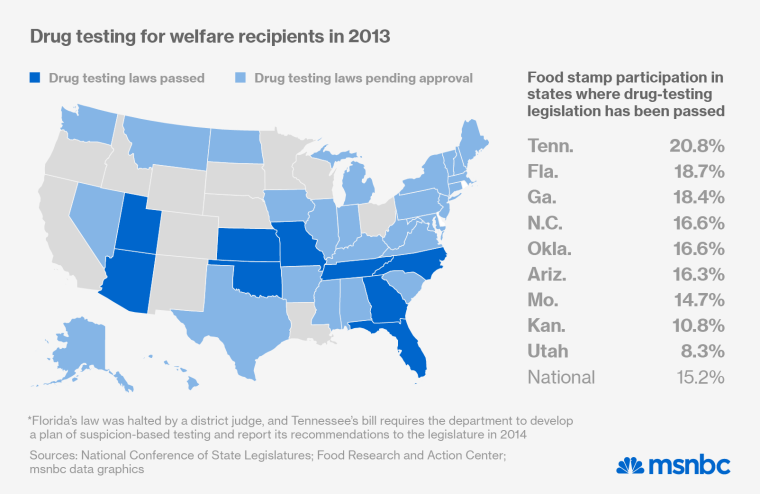Just before the close of Georgia's 2014 legislative session last week, the state's General Assembly granted final approval to a law that would allow state workers to drug test food stamp recipients. The law, H.B. 772, now awaits the signature of Gov. Nathan Deal, a Republican.
An earlier version of the bill would have made drug testing mandatory for all food stamp recipients, but members of the House changed the bill's wording after a federal judge ruled that a similar law in Florida violated the Fourth Amendment. To avoid the same fate, H.B. 772 was rewritten to require "reasonable suspicion" that a food stamp recipient was using illegal drugs before caseworkers could order a drug test.
A spokesperson for the governor declined to comment on whether he would sign the bill. But Chad Brock, a staff attorney with the ACLU of Georgia, said he expected Gov. Deal to sign the law "based on the fact that he did sign a similar drug testing bill a couple years ago" which required drug testing of TANF (Temporary Assistance for Needy Families) recipients. That law was never implemented.
If Deal does make the food stamp bill into law, an ACLU lawsuit is not out of the question.
"We still believe that the factors giving rise to individual suspicion are unconstitutionally broad and would likely be struck down in the courts," said Brock. Under the proposed law, reasonable suspicion can be aroused by something as simple as the food stamp recipient's "demeanor."
The law never specifies what a suspicious demeanor would look like. Its sponsor, Rep. Greg Morris, R-Vidalia, told msnbc it would be up to the Department of Human Services to go into further detail regarding what constitutes reasonable suspicion. H.B. 772 was crafted to give the department as much "flexibility" as possible in establishing guidelines.
"I'm not a law enforcement officer," said Morris. "I'm following the legal counsel to craft a bill that accomplishes what I want to accomplish."
In a statement published shortly after he first introduced the bill, Morris described it as “common sense legislation.”
“Hard working Georgians expect their tax dollars to be used responsibly and efficiently,” he said in the January 22 statement. “Under no circumstance should the government fund someone’s drug habit.”
But similar laws in other states haven't saved the government any money. Florida, for example, spent over $45,000 drug testing welfare recipients to little or no avail, before the state's mandatory drug testing law was found unconstitutional. Morris, at least, has found a way to make Georgia's own proposed drug-testing regime a little cheaper for the state: Under his law, any Medicaid recipient required to take a drug test would also be required to pay the state as much as $17 for the privilege.
"That should raise many different concerns," said Brock. "You're dealing with a population that's already economically distressed, and that's why they're seeking these benefits in the first place."
Morris rejected the notion that $17 would constitute a significant barrier to entry.
"That would be a small pass for entry into an entitlement program," he said. Food stamp benefit levels currently average out to approximately $1.49 per meal.

Georgia Food Bank Association executive director Danah Craft told msnbc the proposed law would further strain Georgia's overextended emergency food assistance infrastructure. Those who couldn't afford to pay for drug testing or tested positive for illegal drugs would come to rely more heavily on the Food Bank Association's member pantries, driving demand even higher than it already is.
"If they're eligible for food stamps, and then for whatever reason have difficulty getting them, then they turn to their local church pantries," said Craft.
Those pantries have already been buckling under the weight of federal-level food stamp cuts, a consistently high unemployment rate, and cuts to other state-level safety net programs. Craft estimated that the Food Bank Association's member pantries now distribute about 103 million pounds of food per year, up from the pre-recession average of 70 million pounds, "and it's still continuing to climb."
Yet Morris seems determined to limit food stamp eligibility even further. In a statement bemoaning the federal court ruling against Florida's mandatory drug testing law, Morris vowed to "work with the Senate on additional ideas to fight fraud, waste and abuse in our welfare system."
"The real problem, I believe, is eligibility," Morris told msnbc. "It's too easy to get on food stamps."
